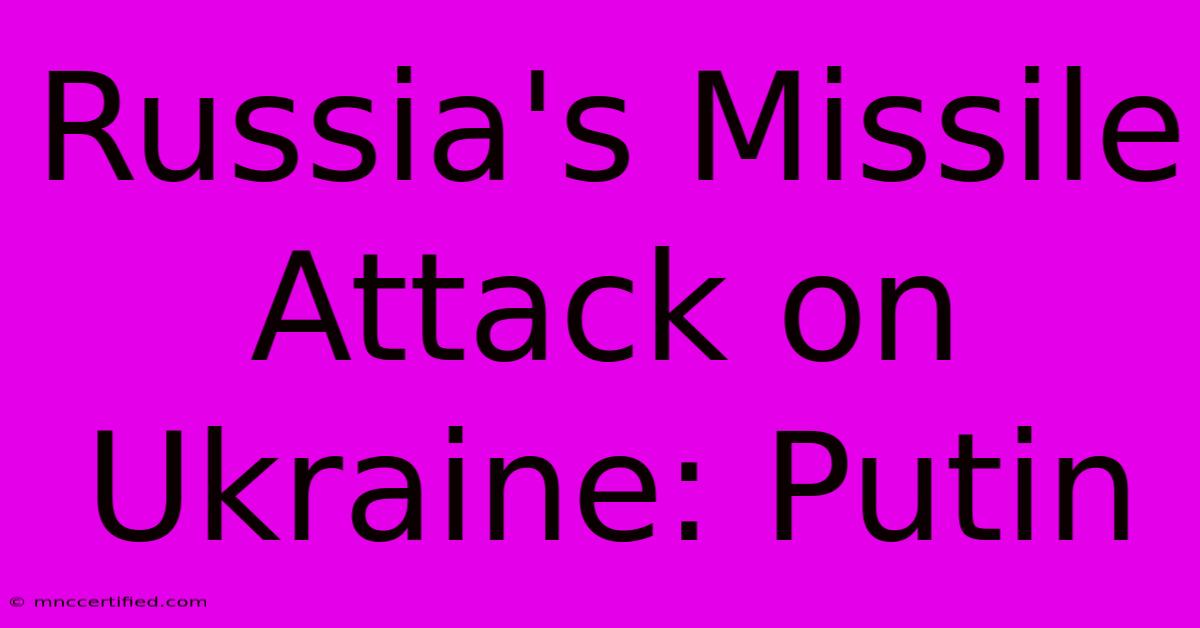Russia's Missile Attack On Ukraine: Putin

Table of Contents
Russia's Missile Attack on Ukraine: Putin's Escalation and the Global Response
Russia's ongoing missile attacks on Ukraine represent a significant escalation in the conflict, prompting widespread international condemnation and raising serious concerns about regional and global stability. Understanding the context of these attacks, President Vladimir Putin's motivations, and the international response is crucial to grasping the current geopolitical landscape.
Putin's Justification and Strategic Goals
The Kremlin consistently frames its actions in Ukraine as a "special military operation," aimed at "denazifying" and "demilitarizing" the country. These claims, widely rejected by the international community, serve as a justification for the relentless bombardment of civilian infrastructure and military targets. However, analyzing Putin's actions reveals a complex interplay of factors driving this aggression:
Securing Territorial Control and Influence:
A primary goal appears to be securing control over Ukrainian territory, particularly in the east and south, areas with strong historical and cultural ties to Russia. The attacks aim to cripple Ukraine's military capabilities and subdue resistance, thereby solidifying Russia's influence in the region.
Weakening NATO and Challenging the West:
Putin's actions can be interpreted as a calculated attempt to weaken NATO and challenge the existing Western-led global order. By provoking a protracted conflict, he aims to expose vulnerabilities within the alliance and potentially fracture its unity. The missile attacks serve as a demonstration of Russia's military might and resolve.
Internal Political Considerations:
Domestically, the conflict and its narrative serve to consolidate Putin's power and distract from internal economic and social issues. Presenting a strong, decisive response to perceived Western threats can boost his popularity among segments of the Russian population.
The Human Cost and International Condemnation
The relentless missile attacks have resulted in a catastrophic humanitarian crisis, causing widespread devastation, displacement, and loss of innocent lives. The targeting of civilian infrastructure, including power grids, water supplies, and residential areas, demonstrates a blatant disregard for international humanitarian law. This has led to strong condemnation from numerous countries and international organizations, with calls for increased sanctions and support for Ukraine.
The International Response: Sanctions and Aid
The international community has responded with a range of measures, including:
- Economic Sanctions: A wave of crippling sanctions targeting the Russian economy, financial institutions, and individuals linked to the regime.
- Military Aid to Ukraine: Provision of weapons, ammunition, and other forms of military assistance to help Ukraine defend itself.
- Humanitarian Aid: Support for Ukrainian refugees and efforts to alleviate the humanitarian crisis within the country.
However, the effectiveness of these measures remains a subject of ongoing debate, with some arguing for stronger, more coordinated action.
The Future Trajectory of the Conflict
Predicting the future trajectory of the conflict remains challenging. The continued missile attacks suggest that Russia is committed to pursuing its objectives, regardless of the humanitarian cost and international condemnation. The outcome hinges on various factors, including the resilience of the Ukrainian resistance, the effectiveness of international support, and the potential for escalation.
The Risks of Escalation:
The potential for escalation remains a significant concern. The involvement of more actors or the use of more destructive weaponry could lead to a wider conflict with unpredictable consequences. Diplomacy and de-escalation efforts remain crucial to avoiding such a catastrophic scenario.
Conclusion: A Critical Turning Point
Russia's missile attacks on Ukraine mark a critical turning point in the conflict. Understanding Putin's motivations and the complexities of the situation is vital for navigating the escalating geopolitical tensions and mitigating the humanitarian crisis. Continued international cooperation and pressure are essential in striving for a peaceful resolution and preventing further suffering. The long-term consequences of this conflict will reverberate throughout the global landscape for years to come.

Thank you for visiting our website wich cover about Russia's Missile Attack On Ukraine: Putin. We hope the information provided has been useful to you. Feel free to contact us if you have any questions or need further assistance. See you next time and dont miss to bookmark.
Featured Posts
-
Steelers Browns Tnf Key Takeaways
Nov 22, 2024
-
British Lawyer Dies In Methanol Case
Nov 22, 2024
-
Hilton Head Homeowners Insurance
Nov 22, 2024
-
Do Expired Tags Affect Insurance
Nov 22, 2024
-
Gaetz Wife Speaks On The Scandal
Nov 22, 2024